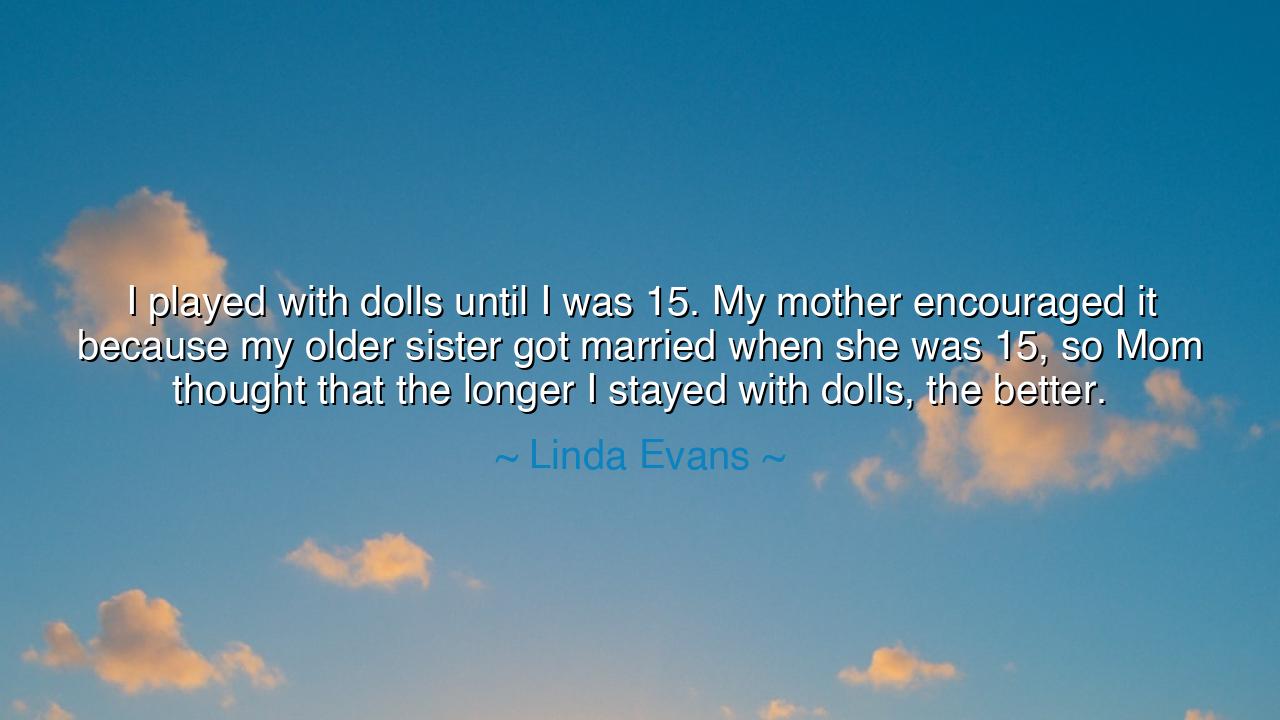
I played with dolls until I was 15. My mother encouraged it
I played with dolls until I was 15. My mother encouraged it because my older sister got married when she was 15, so Mom thought that the longer I stayed with dolls, the better.






In the words of Linda Evans, “I played with dolls until I was 15. My mother encouraged it because my older sister got married when she was 15, so Mom thought that the longer I stayed with dolls, the better,” there lies a gentle yet profound reflection on the fragility of childhood and the burden of early adulthood. Behind her words rests the voice of a generation where innocence was often traded for survival, and where a mother’s wisdom was not found in books but in the quiet prayers of protection over her child. The dolls in this story are more than playthings—they are guardians of youth, symbols of time preserved, and shields against the swift current of life that too often carried young women away before their souls were ready.
To play with dolls at fifteen, in a world that pushes girls toward responsibility too soon, is an act of sacred rebellion. It is a mother’s quiet defiance against a culture that measures worth by marriage rather than by growth. Linda Evans’s mother, having seen one daughter become a bride while still a child, sought to protect the other through the simple magic of imagination. The act of play became her fortress, a way to delay the encroaching shadow of adulthood. This was not foolish indulgence—it was the wisdom of love, disguised as leniency. The mother knew that every year a girl spends dreaming is a year her spirit learns freedom.
In the ancient tales of our ancestors, there were always those who tried to protect innocence from the consuming fires of the world. Think of Penelope, weaving her endless tapestry not merely to wait for Odysseus but to preserve her integrity in a land that wished to claim her too soon. Or of the mothers in forgotten villages who hid their children from wars and hunger by teaching them songs and stories, so that hope might live where food could not. These were acts of preservation, no less heroic than the deeds sung by poets. Linda’s mother stood among them—an unheralded guardian of time.
The contrast between the two sisters—one who married at fifteen, the other who played with dolls—reveals the delicate border between childhood and adulthood, between what is chosen and what is stolen. One crossed that line too soon, perhaps into a world of duties, of expectations, of burdens heavy for tender shoulders. The other, guided by a mother’s weary wisdom, lingered longer on the side of laughter and make-believe. Thus, the story becomes not about the dolls, but about the right to linger, to breathe, to grow at one’s own pace.
History is full of those who were forced to grow before their time. In the fields of factories, in the courtyards of kings, children were made to bear the weight of their elders’ mistakes. But it is also full of those rare souls who fought to preserve the wonder of youth. The painter Pablo Picasso once said that it took him a lifetime to learn to paint like a child again—because childhood, once lost, is not easily reclaimed. What Linda Evans’s mother understood was that protecting innocence is not weakness; it is the foundation of all future strength.
The meaning of this quote, then, is not bound merely to motherhood or childhood—it speaks to all who have ever been hurried by the world. It reminds us that the soul unfolds in its own season, and that to force maturity too soon is to damage the beauty of its bloom. Whether one is fifteen or fifty, to “play with dolls” in the spirit means to nurture imagination, to keep tenderness alive, and to resist the harshness that seeks to harden the heart.
From this, let every reader draw a lesson: do not mock the dreamers, the soft-hearted, or the ones who still find wonder in small things. Protect in yourself the part that still wishes to play, to imagine, to believe. Encourage the young to linger in their youth—not with idleness, but with curiosity. For the child who is allowed to dream without fear grows into the adult who can build without cruelty.
So, remember the mother’s wisdom behind Linda Evans’s words. Guard the sacred spaces of innocence, both in others and within yourself. When the world rushes to make you old, hold fast to what is gentle. For in the simple act of playing with dolls, there may live the deepest kind of wisdom—the wisdom that knows life should be lived, not hurried.






AAdministratorAdministrator
Welcome, honored guests. Please leave a comment, we will respond soon